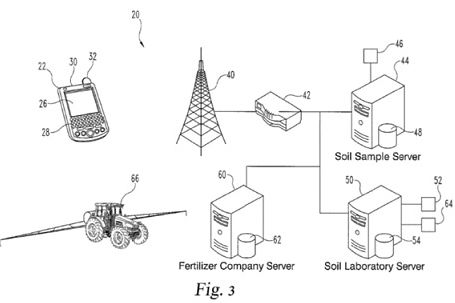
Fort Wayne, Indiana – Magistrate Judge Susan Collins ordered TapLogic, LLC to serve Agri-Labs with more-detailed preliminary non-infringement contentions (“PNICs”) in the ongoing patent litigation between TapLogic and Agri-Labs Holdings, LLC over TapLogic’s smart phone application “Ag PhD Soil Test.”
At issue in this patent litigation is U.S. Patent No. 8,286,857 (the “`857 Patent” or the “patent-in-Suit”), to which Agri-Labs claims ownership. The patent-in-suit, which was issued based upon an application filed by inventor Tony Wayne Covely, has been registered by the U.S. Patent Office. The `857 Patent generally relates to a system and method for performing soil analysis that uses smart phones, applications for smart phones, soil containers having unique identifiers, and global positioning (“GPS”).
In January, an Indiana patent attorney for Agri-Labs filed an intellectual property complaint in the Northern District of Indiana Fort Wayne Division alleging that TapLogic infringed on the ‘857 Patent. TapLogic counterclaimed. It asked the court for a declaratory judgment that it has not infringed Agri-Labs’ patent and that the claims of the patent are invalid. On July 1, 2015, the parties exchanged their respective contentions regarding infringement.
The instant order addresses Agri-Labs’ request that the court order TapLogic to provide a more detailed PNIC. Agri-Labs asserts that the PNICs it received were deficient, providing “nothing more than vague, conclusory language that simply mimics the language of the claims when identifying its theories of non-infringement.”
As is true for a party serving preliminary infringement contentions (“PICs”), a party serving PNICs must provide an infringement-claim chart for each accused product or process (the “accused instrumentality”). Each claim chart must contain the following contentions: (1) “each claim of each patent in suit that is allegedly infringed by the accused instrumentality;” (2) “[a] specific identification of where each limitation of the claim is found within each accused instrumentality, including . . . the identity of the structures, acts, or materials in the accused instrumentality that performs the claimed function”; and (3) “[w]hether each limitation of each asserted claim is literally present in the accused instrumentality or present under the doctrine of equivalents.”
The court noted that TapLogic’s PNICs merely recite the language of each claim and then deny that its Ag PhD Soil Test performs that function or includes that feature. As an example, one portion of Claim 1 was described as “scanning said unique identifier associated with said soil sample container containing said at least one soil sample with a handheld remote terminal, wherein said handheld remote terminal includes a handheld remote terminal sampling application.” In reply, Agri-Labs stated that its application “does NOT scan said unique identifier associated with said soil sample container containing said at least one soil sample with a handheld remote terminal, wherein said handheld remote terminal includes a handheld remote terminal sampling application.”
Consequently, the court agreed that TapLogic’s PNICs were inadequate because they lacked sufficient detail. It ordered TapLogic to serve Agri-Labs with detailed PNICs.
The case was assigned to Judge Robert L. Miller, Jr. and Magistrate Judge Susan L. Collins in the Northern District of Indiana, Fort Wayne Division and assigned Case No. 1:15-cv-00026-RLM-SLC.
 Indiana Intellectual Property Law News
Indiana Intellectual Property Law News

